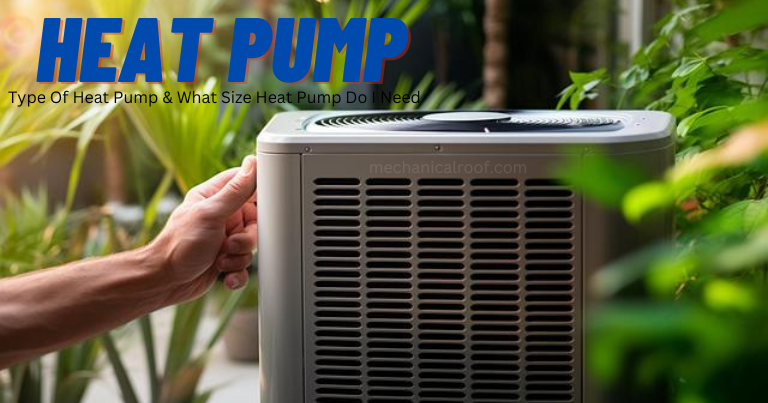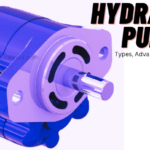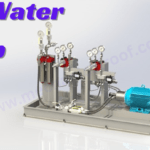Introduction
This blog will take an in-depth look at Heat Pump. The blog will bring more detail on topics such as:
- What Is A Heat Pump?
- Type Of Heat Pump
- What Size Heat Pump Do I Need?
- How to Calculate the Required Heat Pump Size
- Different Type Property Of Heat Pump
- How Much Space Do I Need?
- Flow Temperature Of Heat Pump
- Required Room Temperature
- Advantages And Disadvantages Of Heat Pump
- Components Fail In A Heat Pump
- Related FAQ’S
What Is A Heat Pump?
A heat pump is part of your home’s heating and cooling system and is installed outside your home. Like central air conditioning, it can cool your home, but it can also heat your home.
During the colder months, the heat pump draws heat from the cold air outside and transfers it into the home, and during the warmer months, it extracts heat from the indoor air to cool your home Heat is transferred electrically for use as a refrigerator in order to provide year-round comfort. Because they handle heating and cooling, homeowners may not need to install appliances to keep their homes warm.
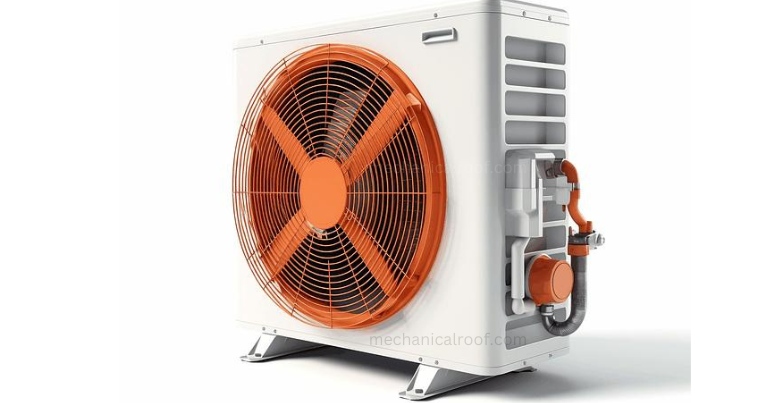
An internal electric heater can be added to the internal fan coil for further efficiency in extremely cold climates. A heat pump does not burn fuel like a furnace, making it less harmful to the environment.
Heat pumps are all of the rage in recent times, in particular in Europe, where a few international locations are striving to prohibit the installation of fossil-gasoline-fired furnaces and boilers in desire of greener options, which include strength-saving warmth pumps.
Type Of Heat Pump
The size of the heat pump will also vary according to the type of heat pump.
Knowing whether an air source vs ground heat pump is best for your home depends on circumstances.
There are two types of heat pumps:
- Ground source heat pumps
- Air source heat pumps
1- Ground source heat pumps
A ground source heat pump transfers heat from an underground source outside the property to a central heating system, whether this is a wall-mounted heat pump, radiator, or floor heating.
The heat flux from the earth should be fairly constant throughout the year.
The amount of power produced by a heat pump is greatly affected by the temperature of the internal energy, and the soil temperature is constant
As a result, the output from a geothermal heat pump will not be that different.
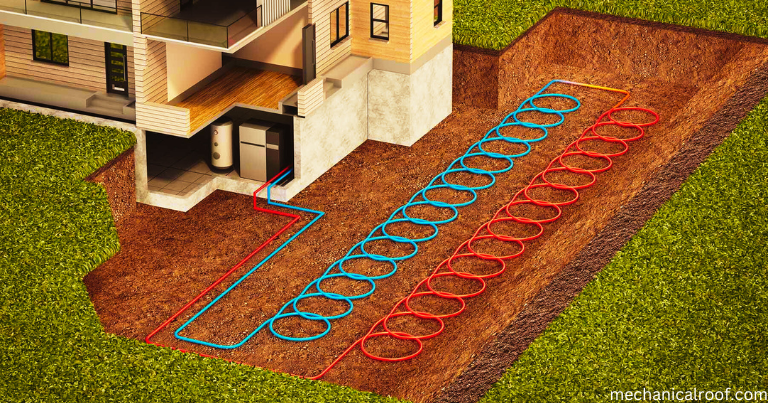
2- Air source heat pumps
An air source heat pump absorbs heat from outside air, then transfers it to heat it inside.
Unlike ground heat pumps, air source heat pump installations have large variations in process temperature.
This is even more impressive in exposed areas and northern climes.
Because of this, the power output will vary greatly.
The colder the air temperature, the less heat the air source heat pump can produce.
As a result, the size of the exhaust gas for a heat pump will generally be larger than on earth.
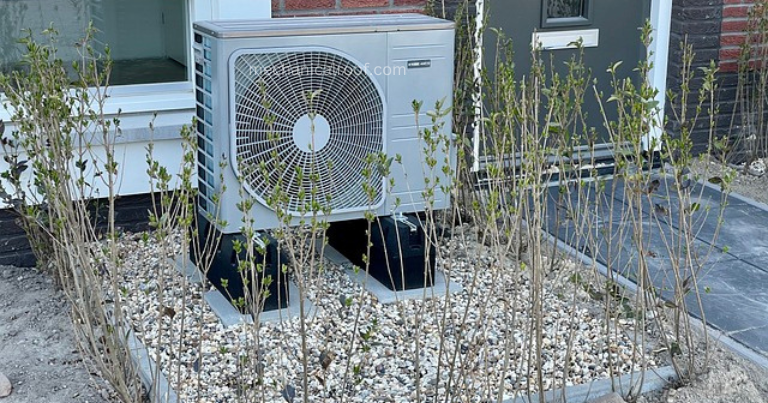
What Size Heat Pump Do I Need?
Many homeowners considering installing a heat pump are a bit unsure about the right size for their home.
Heat pumps are relatively new technology, so it’s hard to figure out how big a unit is enough to actually heat a space of its size
Of course, how big or small a heat pump you need when buying for the first time is a common question.
How to Calculate the Required Heat Pump Size
- The amount of heat energy delivered is determined by the term output size of a heat pump.
- This will be in kilowatts.
- Property size and energy efficiency will greatly affect production.
- Properties with more insulation or double or triple glazing can hold the heat better, so a heat pump with its lowest output level will suffice.
- It is usually best to consult with a heat pump installation professional to get an estimate of the heat pump size required for your home.
- This is even more important with older products and common radiators.
- In order to calculate the appropriate heat pump size for a particular property, a complete system design will need to be prepared.
- Naturally, this is something that can only be done by a professional.
- It’s also worth mentioning that every property has unique needs, and every homeowner will have their own preferences.
Different Type Property Of Heat Pump
The type and age of the property are major considerations.
- If the property is new housing, building codes that specify certain insulation may be reviewed.
- The heat loss rate can be calculated to determine the size of the heat pump to be installed at the system level.
- However, calculating heat loss in older homes is a bit more complicated.
- In most cases, the property will need to be surveyed to determine the number of rooms, locations and uses including insulation and heat loss
- Seasonal temperature fluctuations and indoor temperature preferences will need to be determined.
- Also note that some rooms will need heating more often than others, such as bathrooms and living rooms.
- This will affect the heating requirements of the house, thus affecting the number of heat pumps needed.
How Much Space Do I Need?
The space required will be based on the following:
1- Selection of heat pump type 2- Be the required size 3- Whether or not there is an existing hot water tank.
- First, you need to decide whether to install a split or single heat pump.
- The latter will take up space in the back of the house, varying in size from the unit according to the outlet of the heat pump.
- To give you an idea, a 2 and 3-bedroom house will require a monoblock heat pump with an output of 5 kilowatt to 9 kilowatt, and the average unit size is about 1200 mm . and 370 mm in diameter.
- Single-stage heat pumps are preferred as long as there is sufficient outdoor space.
- A split heat pump will usually have smaller external components than a single internal one, but you will also need an indoor unit.
- Rooms vary in size
- You should also consider if you have access to a separate hot water tank as well, if you don’t already have one.
- There are freestanding units with integrated hot water storage, which are generally desirable because of their size
Flow Temperature Of Heat Pump
Flow Temperature A term used to refer to the temperature of the water that circulates around the radiator in the house, to reach the desired room temperature The size of the radiator and the insulation layer will affect the temperature of the flow. If you have underfloor heating, you’ll need to take this into account as well.
The smaller the heat loss, The smaller the warmth loss, On the other hand, if the radiators are large, the flow temperature will be that much lower. If the radiators must be too small, the flow temperature will need to be higher to achieve the desired consistent room temperature. If the insulation is to a suitable standard, low levels of heat will be dissipated from the outside, so less heating will be needed to achieve the desired indoor temperature.
As you can see, there are a variety of factors to determine when determining the appropriate size of a heat pump. However, in general, when a house is well insulated, only 1 kilowatt of heat is required for heating every 25 meters squared. On the other hand, if the property has a poor level of insulation, 1 kilowatt of heat will be required for only about 10 meters squared. An important difference.
Required Room Temperature
1- The desired room temperature relies upon on the house owner’s specific possibilities.
2- Most people decide upon their houses to be round a regular 21 ranges celsius.
3- Obviously, the lower the temperature one prefers, the smaller the heat pump required.
4- The difference between common outdoor temperature and the desired indoor temperature can then be used so that it will determine the full warmth loss from the house, and thus opt for the most appropriate warmness pump size.
Advantages And Disadvantages Of Heat Pump
Advantages Of Heat Pump
- 1. Save on fossil fuel costs
- 2. Heat pump is efficient
- 3. Permanent thermal solution
- 4. Low maintenance and easy to use
Disadvantages Of Heat Pump
- 1. Increased electricity utilized
- 2. More preparation is needed to design the system
- 3. You may need to install new radiators
Components Fail In A Heat Pump
- Your thermostat needs to be recalibrated.
- The air filter out is grimy and needs to be modified.
- Outside coils are dirty and want to be hosed off.
- There is a refrigerant leak.
- The warmness pump is simply too massive or small for your home.
Related FAQ’S
What is the important trouble of a heat pump?
Answer: Leaking refrigerant is one of the maximum common reasons for warmth pump troubles. Your heat pump makes use of this liquid chemical to chill and warm air. As your heat pump’s refrigerant delivery slowly dwindles, it’ll struggle to fulfill the setting on your thermostat, causing it to run longer.
How long do heat pumps close?
Answer: 15 years
The life expectancy of a warmness pump relies upon several elements, which include the sort of heat pump, your area, and the way properly the warmth pump is maintained. Heat pumps normally final a median of 15 years, though a few can put on out after a decade. Some of the newer devices being synthetic today can last a piece longer.
Do heat pumps drain?
Answer: This may occur on a hot, humid day. As humid air is drawn across the bloodless copper coils, condensation paperwork and drains off. The condensate drain line will bring this water out of doors your private home. It can drain up to twenty gallons in keeping with the day.
Do warmth pumps shop?
Answer: Heat pumps use strength to transfer in preference to create warmness, making them a whole lot greater efficient than conventional HVAC structures. Depending on what heating system you are updating from, you could save as much as 7.6 T of carbon emissions in keeping with yer.
How do you maintain a warmth pump?
Answer: This includes the top, aspects, bottom, and around the warmth pump. Keep the out-of-door coils clean. If they get grimy you can use a heavy responsibility degreaser and hose them down.
Conclusion
When it comes to what length heat pump I want, there may be no person size fits all answer to this question There are different factors to do not forget, as mentioned and private possibilities to consider that’s why it is important to are searching for the professional recommendation of a heating engineer.

